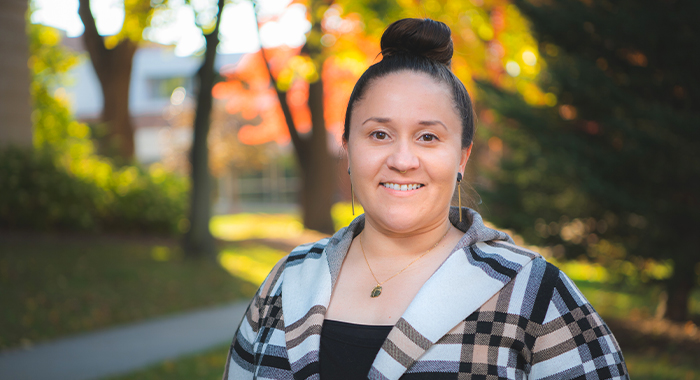King Revives Language, Renews Culture Through First Nations Education
Rosa King (Education) has dedicated her career to the revitalization of an endangered language and the rekindling of a cultural heritage. Her unique role as an educator at both St. Norbert College and within the Oneida Nations school system helps forge connections for future teachers.
King’s journey as an educator began more than a decade ago when she started teaching the Oneida language. Now at Tehatiwʌnakhwa, a small charter school in the Oneida Nations school system, King teaches in a K-2 combined classroom where students are immersed in the Oneida language. The immersion program has a clear mission: to save the Oneida language from the brink of extinction.
“The Oneida language is very much in a state of emergency,” King emphasizes. “The numbers of Oneida language speakers are really, really low, and the work that I’ve done pretty much my whole professional life has been to restore and revitalize the Oneida language.”
Giving back
King’s work in language revitalization and indigenous education complements her role at St. Norbert College, where she teaches the First Nations of Wisconsin course to students pursuing their own careers as educators. She says she feels a deep sense of responsibility to positively impact the education landscape, especially as it regards First Nations people.
“I always feel like, as an educator, I have a responsibility to give back in some way,” she shares. “Part of my doctoral degree was really focused on First Nations education and applying that in the community. One of the things I learned was how little knowledge there was for teachers about First Nations people. That was something that I wanted to be able to positively impact in some way, and this class [at St. Norbert] really helps do some of that. Because it’s really the impact that I could have on these students, that they could then have on their future students from whatever background they come from.”
Within her classroom at St. Norbert, King doesn’t shy away from discussing the challenging history and policies that have affected indigenous communities, particularly the loss of language. These discussions shed light on the impact of these policies, offering students a deeper understanding of the struggles and triumphs of indigenous communities.
“A lot of the U.S. federal policies impacted the ways of life of indigenous people,” she acknowledges. “At the forefront, that includes language and the loss of language.”
At St. Norbert College, King’s passion finds a home that echoes her values because she says the institution shares her commitment to social justice and equity.
“I’m so grateful for this opportunity because I could share my experience … and open the minds and hearts and eyes of students to this wealth of knowledge that really is in the world, from all different types of people, from every single background,” King says.
Language as medicine
A quest to reconnect with her heritage and identity led King to learning the Oneida language and, ultimately, to her role as an educator.
“I was born and raised on the reservation. Because of the state of our language, a lot of people really didn’t have the knowledge or the access to language,” King reflects. “It really was still very much something that wasn’t being passed down through generations in our families and in our community.”
She views the Oneida language as a form of medicine. “All of these impacts that still affect our people, from federal policies to the history of our people, it’s our language and our culture and our traditional ways that can be used to begin a process of healing in addressing the trauma that’s associated with those events.”
The urgency of her mission is evident. King acknowledges that the work is challenging, but the reward is immeasurable. “If we weren’t doing it, I don’t know who would,” she notes. “Who knows where our language will be if we don’t do it. It really keeps you going, keeps you focused. The whole goal is to make sure our language lives on well into the future.”
Oct. 25, 2023












